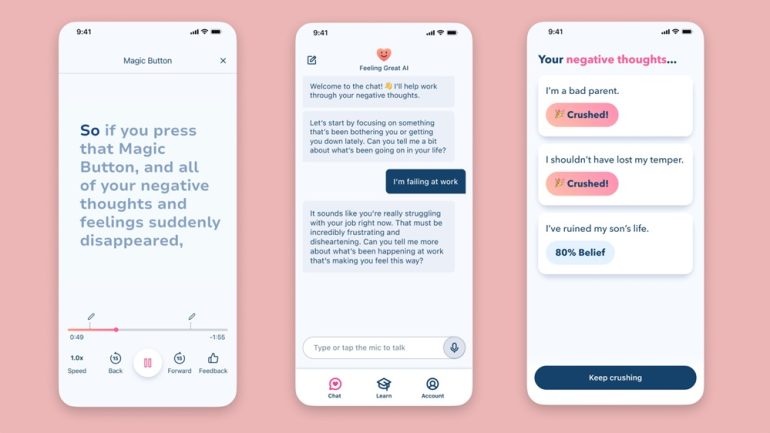- AI-powered app for Cognitive Behavioral Therapy (CBT) developed by Dr. David Burns and Jeremy Karmel
- Feeling Great was founded in 2022 and secured $8 million in seed funding
- Funding led by Learn Capital and TitleTownTech, with additional investors
- The app launched after beta testing with approximately 3,000 users
- 14 employees, planning to use funds for development and marketing
- The app includes interactive mental health courses and a chatbot for emotional support
- Leverages modern AI models to enhance therapeutic processes
Main AI News:
Navigating the intricacies of mental health support, some innovators are using AI to systematize methods like Cognitive Behavioral Therapy (CBT) for those lacking professional access. Dr. David Burns, a psychiatrist with over 40 years of experience, has introduced an app named Feeling Great, reflecting his established methodologies.
In partnership with Jeremy Karmel, formerly of DoorDash and Reddit growth teams, Burns launched Feeling Great, mirroring the title of one of his bestselling mental health books. Established in 2022, the company recently announced an $8 million seed funding round, co-led by Learn Capital and TitleTownTech, with additional backing from Lux Ventures, WaveMaker Three-Sixty Health, Pacific Health Ventures, and Treble Capital. The app, officially launched today after a beta phase with around 3,000 users, plans to allocate the funds towards further development and marketing.
Operating with a 14-member team, Feeling Great intends to deploy the new capital to enhance its app’s functionality and broaden its market presence. Rob Hutter, founder and managing partner at Learn Capital, revealed his longstanding interest in Burns’ work. Reuniting with Burns, Hutter discovered the collaboration with Karmel and chose to invest, highlighting the synergy of Burns’ expertise and Karmel’s growth acumen as key for scaling the app.
The app’s technology merges Burns’ vast expertise with cutting-edge AI models to streamline the therapeutic process. Burns noted that an app featuring guided lessons was conceived before the rise of large language models. However, these modern AI innovations have significantly amplified the app’s effectiveness.
Feeling Great comprises two primary sections: interactive mental health courses, emotion management lessons conveyed through illustrations and narratives, and a chatbot interacting with users to discuss their issues, offering actionable techniques to alleviate negative emotions.
Conclusion:
The launch and funding success of the Feeling Great app highlights a growing trend in the mental health market towards integrating AI with traditional therapeutic methods like CBT. This development underscores the potential of AI to democratize access to mental health support, especially for those who may not have the means to seek professional help. The combination of Dr. Burns’ expertise and Jeremy Karmel’s growth experience positions the app for significant scalability and impact. As the mental health tech sector expands, innovative solutions like Feeling Great will likely drive competition, improve accessibility, and potentially reshape how mental health services are delivered and consumed.

